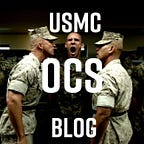What Happens When You’re Sick or Injured at OCS?
First of all, there’s a difference between “hurting” and “hurt.”
Everyone will be hurting. Many will get hurt, or injured.
The Best Medicine
The first line of defense is prevention. Do everything you can ahead of time to injury-proof your body. Improve flexibility with yoga and stretching. Improve your muscular and skeletal systems with PT and lifting (and drinking your milk?) and address any imbalances or weaknesses as early as possible.
First Line of Defense: Sick Call
At OCS, a Navy Corpsman will be in your squad bay prior to the start of every day for Sick Call. You can bring up any issues with him and receive basic aid such as motrin or ankle taping, for example. At that point, you can discuss more serious issues and if you want it addressed further with…
The Professionals
There are two full clinics at OCS. First is a regular hospital-like Medical clinic with a Navy doctor on staff who can address more serious injuries or illnesses and prescribe medicine, aka BAS (Battalion Aid Station). Second is Sports Med, where no expense is spared to address athletic injuries by a team of professionals with a host of specialized medical equipment.
[caption id=”attachment_4014" align=”alignleft” width=”150"]
Today’s veteran corpsmen have seen worse feet than yours[/caption]
Your Status Options
You can miss a small amount of training at Medical or Sports Med without consequence. The staff will monitor you but you will not be penalized unless you are seen to be shirking duty, or “malingering.” If you have a more serious injury, you are often given an option to try to gut it out and push through on pain killers. Prohibitively serious injuries or illnesses usually result in getting sent home with an invitation to reapply.
Official candidate regulations explain limited duty options as follows: Candidates may be placed in a limited duty or no duty training status, after a sick call examination by a medical officer or independent duty corpsmen.
1. Training Status. Candidates in a “no duty status” are excused from all training for the period specified. Candidates in a “limited duty status” will participate in all classroom instruction and examinations, in addition to participating in “limited” drill, physical training, and field exercises as directed by competent medical authority. In those cases where the candidate cannot participate he/she will observe the restricted event.
Recommendation
Realistically, most candidates are hurting and sustain blisters, sprains and aches at OCS. If the staff believes in you, they will keep you at OCS as long as possible to recover from or push through your illnesses and injuries. Many candidates have even missed “mandatory events” or graduated on crutches because the OCS leadership saw their officer potential and willingness to push through pain.
Don’t be afraid to seek medical attention at OCS. Quickly reacting to illness or injury allows the medical staff to do their job.
Can you push through the pain without significantly or permanently injuring yourself? Then it will be worth it.
